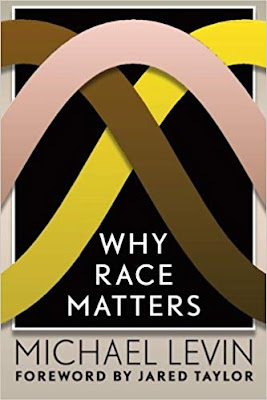"Why Race Matters," by Michael Levin
Posted by John Engelman, Raceology, October 10, 2019.
Race matters because the races differ in average qualities necessary to creating and maintaining a thriving society. These are intelligence, obedience to the law, and monogamy.
Everywhere Negroes live they are accurately characterized as being less likely to be intelligent, more likely to break the law, and less likely to get married and to stay married to the people with whom they have children.
Because these characteristics are durable geographically and historically, they indicate genetic causation. Intelligence is fairly stable. Crime and illegitimacy fluctuate. Nevertheless, when they are low they are lower for whites than blacks. When they are high they are higher for blacks than whites.
Michael Levin points out, “In 1950 the white illegitimacy rate was 1.7%, and the black rate 16%.”
In 2012 the white non Hispanic illegitimacy rate was 29.1%. The black rate was 72.3%.
From 1960 to 1980 the black and white crime rates both increased. The black rate increased more. Professor Levin attributes this to the greater innate inclination of blacks toward crime, and to the fact that the civil rights movement caused the criminal justice system to extend to blacks safeguards previously granted only to whites.
He points out that in 1920 a black mugger would be apprehended and quickly sentenced to a chain gang. Now punishment is less likely and less severe.
Liberals blame black dysfunction on white racism. Professor Levin asks: if this is true, why have black rates of crime and illegitimacy increased since 1964, when the Civil Rights Act was signed and the War on Poverty was inaugurated? Why has black academic performance not improved, despite much more money spent on black public education, and expensive programs like Head Start and No Child Left Behind?
Conservatives blame black dysfunction on the welfare system. Professor Levin tends to agree, but he thinks the real culprit is the black genome.
Professor Levin gives too little attention to the reasons racial differences evolved. For an explanation of that we should turn to “A Farewell to Alms: A Brief Economic History of the World, by Gregory Clark,
https://www.amazon.com/gp/review/RF7DRN09TU6IS?ref_=glimp_1rv_cl
“A Troublesome Inheritance: Genes, Race and Human History,” by Nicholas Wade,
https://www.amazon.com/gp/review/RS1CNJ677HVQB?ref_=glimp_1rv_cl
and “The 10,000 Year Explosion: How Civilization Accelerated Human Evolution,” by Gregory Cochran and Henry Harpending.
https://www.amazon.com/gp/review/R1QW7U2G2GJTXC?ref_=glimp_1rv_cl
Tribes exist when governments are ineffectual or do not exist. In a tribal environment all men fight in the wars. The best warriors have more than one wife and consequently more sons who inherit their violent inclinations and aptitudes. Also, in a tribal environment men are expected to avenge injustices done to them, their friends, and their relatives.
A young poor ghetto black man who is shot by another young black man he knows often does not identify the shooter to the police. While he recovers in a hospital he thinks, “I know who did it. When I get out I will get back at him.“ When he gets out he kills the man who shot him. The man’s friends kill him. His friends kill them. So it goes. This is more than the culture of the underclass. It is the expression of instincts that are functional in a tribal environment.
During most of history in urban civilizations criminals were killed at the scene of the crime, they died in custody, or they were executed. In some cultures they were enslaved and worked to death. The few children they had rarely lived to adulthood. Thus crime genes were removed from the gene pool. This is why races that have practiced civilization the longest have lower crime rates.
In urban civilizations men who have the intelligence to become merchants, government officials, scribes, scientists, and so on usually become prosperous. Consequently more of their children survived and reproduced. This is why races that have practiced civilization the longest have the highest IQ averages.
Why Race Matters was first published in 1997. It was republished in 2005. Since then genes have been discovered that influence intelligence and criminal behavior. If Why Race Matters is published in a new edition, mention should be made of these genes.
Why Race Matters is written with academic prose that prevents it from being read by a large population. Professor Levin should have written it with the assistance of a journalist.
When one presents an argument that many people do not want to accept, the argument must be easy to follow. It needs to be based on assertions that most people know to be true. What Professor Levin says in Why Race Matters is said better and with fewer words in “Race, Evolution, and Behavior: A Life History Perspective,” by J. Philippe Rushton.
https://www.amazon.com/gp/review/R1FCUU9G2TJRWI?ref_=glimp_1rv_cl
Also, by emphasizing black stupidity, crime, and promiscuity Professor Levin gives little attention to the fact that many blacks are intelligent, law abiding, and monogamous.
Think of a decent young black man. He probably attended a black majority public school where he was ostracized and maybe beaten up for “acting white.” Nevertheless, he did the best he could academically, stayed out of trouble, and graduated from high school. Even so, wherever he goes whites who do not know him assume that he is dangerous and inferior.
Once I read a letter to the editor of a newspaper written by such a youth. He wrote:
“When I get on a bus women hold their purses more tightly. Men pick up their briefcases and put them on their laps. I always have a seat to myself even though I do not smell badly. I see the fear in their eyes. it is heartbreaking.”


Comments
Post a Comment